NBA & WNBA (Pro), International (FIBA), College (NCAA), High School and Junior High School courts vary on the overall layout and dimensions but the inner court markings for the “Foul Line” and the backboard dimensions and rim size remains the same.
Basketball Court Lines
Court Dimensions:
- Professional NBA and College Basketball court is 94 feet (29 m) by 50 feet (15 m).
- International Basketball the court 28 meters (92 ft) by 15 meters (49 ft).
- High school, and Junior High court 84 feet (26 m) by 50 feet (15 m).
The Foul Line: For all Courts, The foul line distance is 15′ from the foul line to the front of the backboard and 18′ 10″ from the baseline.
The Key: Also called the free throw lane or “the paint” is 16 feet wide for NBA and FIBA, and 12ft wide for College, High school and Junior High play and Extends 15’from the backboard to the free throw line
Circles: There are three 6′ circles on a court, one in the center of the court and one on each end centered on the foul line.
3 Point Line or Arc:
- 19.75 ft (6.01 m): High School
- 22′ 1.75″ (6.72 m): NCAA
- 21.65 ft (6.60 m) to 22.15 ft (6.75 m): WNBA and FIBA
- 22 ft (6.71 m) to 23.75 ft (7.24 m): NBA
The Division Line: Line that marks the center of the court
Diagram for an NBA Full Basketball Court
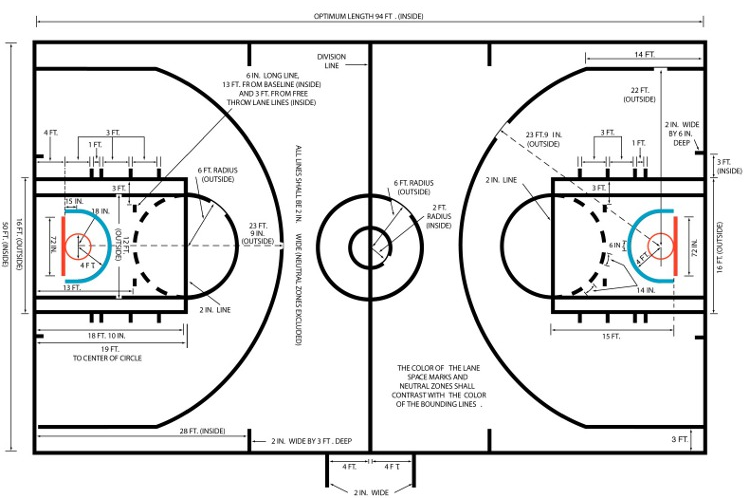
Diagram for an International Full Basketball Court
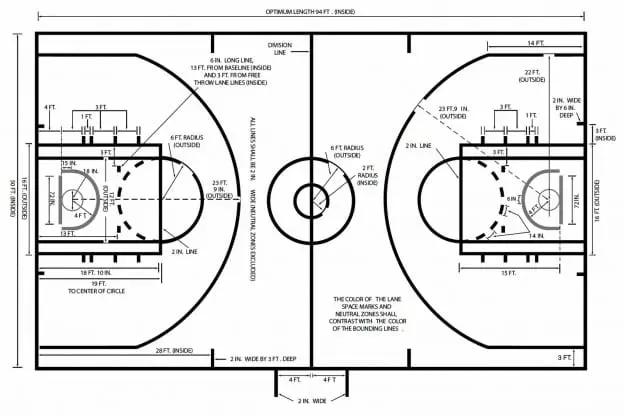
Diagram for a College Basketball Court
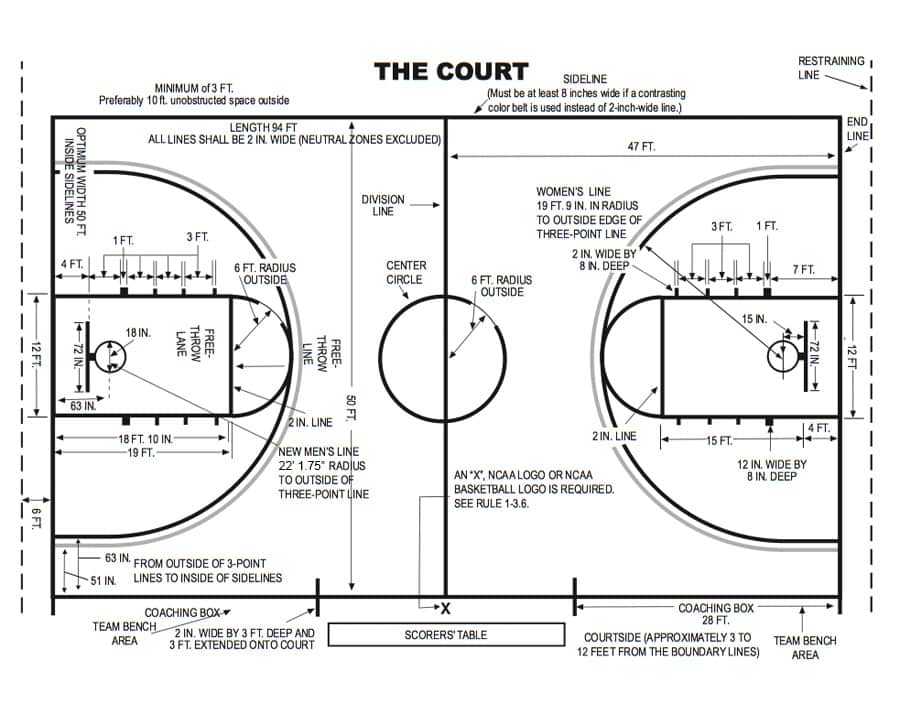
Diagram for a High School Basketball Court
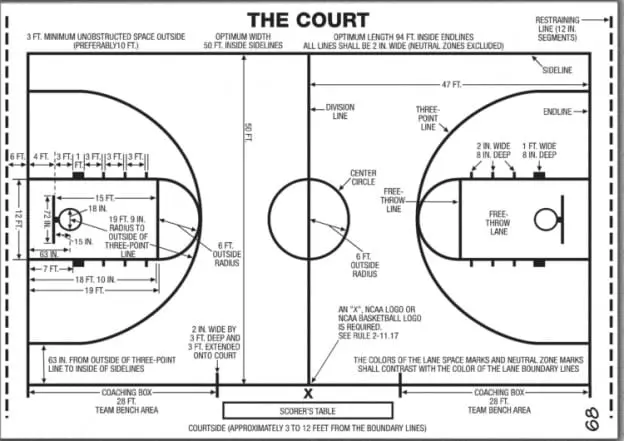
Diagram of a Basketball Half Court
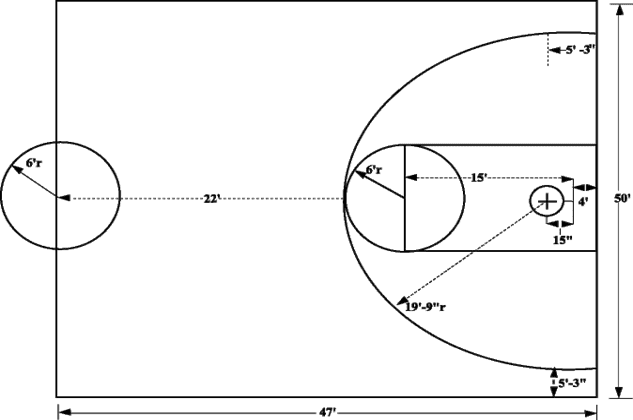
Written by Jackie Reimann, a Basketball Goal Specialist at Recreation Unlimited and the BasketballGoalStore.com




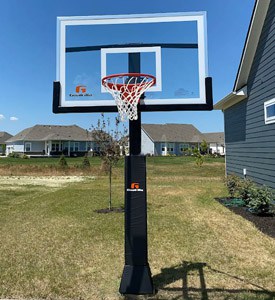
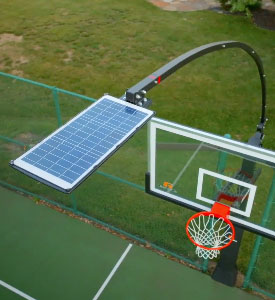

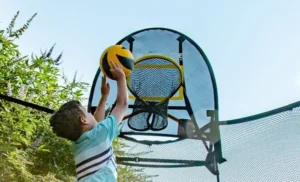



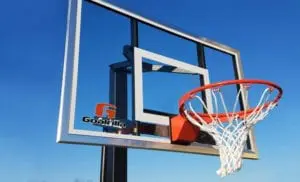

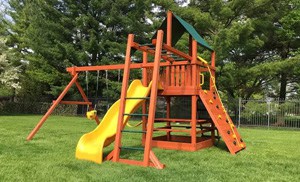

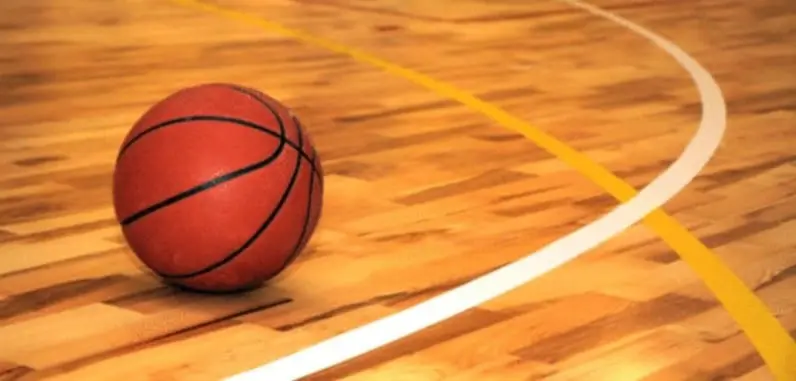
looking for my grandsons thanks for all dim. for half court
What are the two 6 inch lines just toward the baseline from the free-throw line and inside of “the paint” for? they seem to be aligned with the edge of the free-throw circle closest to the baseline. What rule are they intended to be associated with?
Thanks, Paul
Paul,
We have done extensive research and are finding that these lines are not consistently used throughout the entire sport of basketball (high school, college; women’s, men’s; etc.), and I’m not showing a specific name. If I happen to come across this I will pass along the information. Great question!
What is double foul ?
When two fouls are committed at the same time by opposing players against each other. The penalties offset each other, but both players are charged with personal fouls.
Paul, the two lines inside the key (aligned with the edge of the free throw circle) help mark the top of the Lower Defensive Box (LDB). The hash marks on the baseline mark the sideways extent. This otherwise unmarked region is mentioned a bit in the NBA rulebook for eligibility of certain fouls.
The 5′-3″ offset of the three point line from the outer boundary line of the court is ambiguous. It should be 3′-0″ from the side outer boundary line.
Thank you for the feedback. Recreation Unlimited will definitely take this into consideration.
Do you have the sizes with the out of bounds part of the court included in the full dimensions? Like the dimensions of the full slab?
John,
That’s a great question! We don’t provide the exact concrete slab measurements nor do we provide the actual work of laying the concrete or designing courts. However, we do our best to provide tools such as the basketball court diagram blog for our basketball goal customers. I hope this helps! Have a great day.
On the last diagram of the high school basketball half court, the vertical/short size says 50′ and the horizontal/long side says 47′. Are those measurements flipped? Or is the horizontal line really supposed to be 3′ shorter than the vertical line (it looks longer)? Thanks!
Hi Smurti, thanks for your comment, and good eye! The optimum width of the court is 50′, and the half court length is 47′, so yes, it is 3′ shorter. The last diagram you’re referring to is not 100% to scale, so that is the reason for the discrepancy.